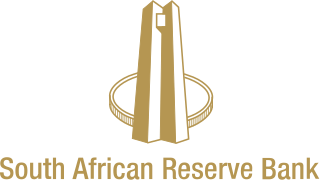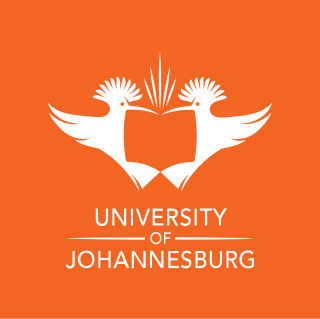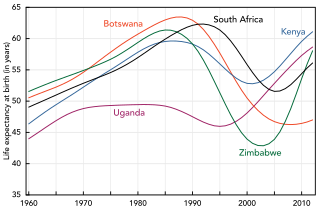Economic Society of South Africa (ESSA), established in 1925 is a "discussion forum" for South African economists in academic life, government and business. It is chaired by M.V. Leibbrandt.

South Africa, officially the Republic of South Africa (RSA), is the southernmost country in Africa. It is bounded to the south by 2,798 kilometres (1,739 mi) of coastline of Southern Africa stretching along the South Atlantic and Indian Oceans; to the north by the neighbouring countries of Namibia, Botswana, and Zimbabwe; and to the east and northeast by Mozambique and Eswatini (Swaziland); and it surrounds the enclaved country of Lesotho. South Africa is the largest country in Southern Africa and the 25th-largest country in the world by land area and, with over 57 million people, is the world's 24th-most populous nation. It is the southernmost country on the mainland of the Old World or the Eastern Hemisphere. About 80 percent of South Africans are of Sub-Saharan African ancestry, divided among a variety of ethnic groups speaking different African languages, nine of which have official status. The remaining population consists of Africa's largest communities of European (White), Asian (Indian), and multiracial (Coloured) ancestry.

An economist is a practitioner in the social science discipline of economics.
The Society has approximately 600 members and is organised in nine branches. Over the years members have played a major role in applying economic thinking to and analysing South African economic issues . Distinguished members of the Society have included Cabinet Ministers, Governors of the South African Reserve Bank, Chief Executives of Companies, Directors-General of Government Departments, and internationally acclaimed academics.

The economy of South Africa is the second largest in Africa, after Nigeria. It is one of most industrialized countries in Africa. South Africa is an upper-middle-income economy by the World Bank – one of only four such countries in Africa. Since 1996, at the end of over twelve years of international sanctions, South Africa's Gross Domestic Product almost tripled to peak at $400 billion in 2011, but has since declined to roughly $295 billion in both 2016 and 2017. In the same period, foreign exchange reserves increased from $3 billion to nearly $50 billion creating a diversified economy with a growing and sizable middle class, within two decades of ending apartheid. South African state owned enterprises play a significant role in the country's economy with the government owning a share in around 700 SOEs involved in a wide array of important industries. In 2016 the top five challenges to doing business in the country were inefficient government bureaucracy, restrictive labour regulations, a shortage of skilled workers, political instability, and corruption, whilst the country's strong banking sector was rated as a strongly positive feature of the economy. The nation is amongst the G-20, and is the only African member of the group.

The South African Reserve Bank (SARB) is the central bank of South Africa. It was established in 1921 after Parliament passed an act, the "Currency and Bank Act of 10 August 1920", as a direct result of the abnormal monetary and financial conditions which World War I had brought. The SARB was only the fourth central bank established outside the United Kingdom and Europe, the others being the United States, Japan and Java. The earliest suggestions for the establishment of the Central Bank in South Africa date back to 1879. A select committee, consisting of ten members of Parliament was established on 31 March 1920 to examine the benefits to the national interest of the establishing of the central bank.
ESSA publishes the South African Journal of Economics , established in 1933, which is one of the leading international regional journals. The journal covers the discipline in general, including methodology and economic history and, in more recent times, econometrics. Its editorial organisation has recently been extended to allow for a more effective editing of papers on specialised topics.
South African Journal of Economics is a quarterly peer-reviewed economics journal published by Wiley-Blackwell on behalf of the Economic Society of South Africa (ESSA). The journal was established in 1933. The journal publishes information on economic issues affecting African countries. General topics of focus include health issues, inflation issues, monetary and fiscal policy issues, regulatory issues and information on the South African Political Economy.
Economic history is the study of economies or economic phenomena of the past. Analysis in economic history is undertaken using a combination of historical methods, statistical methods and the application of economic theory to historical situations and institutions. The topic includes financial and business history and overlaps with areas of social history such as demographic and labor history. The quantitative—in this case, econometric—study of economic history is also known as cliometrics.
Econometrics is the application of statistical methods to economic data in order to give empirical content to economic relationships. More precisely, it is "the quantitative analysis of actual economic phenomena based on the concurrent development of theory and observation, related by appropriate methods of inference". An introductory economics textbook describes econometrics as allowing economists "to sift through mountains of data to extract simple relationships". The first known use of the term "econometrics" was by Polish economist Paweł Ciompa in 1910. Jan Tinbergen is considered by many to be one of the founding fathers of econometrics. Ragnar Frisch is credited with coining the term in the sense in which it is used today.
Development economics is a branch of economics which deals with economic aspects of the development process in low income countries. Its focus is not only on methods of promoting economic development, economic growth and structural change but also on improving the potential for the mass of the population, for example, through health, education and workplace conditions, whether through public or private channels.
Agricultural economics is an applied field of economics concerned with the application of economic theory in optimizing the production and distribution of food and fiber. Agricultural economics began as a branch of economics that specifically dealt with land usage, it focused on maximizing the crop yield while maintaining a good soil ecosystem. Throughout the 20th century the discipline expanded and the current scope of the discipline is much broader. Agricultural economics today includes a variety of applied areas, having considerable overlap with conventional economics. Agricultural economists have made substantial contributions to research in economics, econometrics, development economics, and environmental economics. Agricultural economics influences food policy, agricultural policy, and environmental policy.

Economic sociology is the study of the social cause and effect of various economic phenomena. The field can be broadly divided into a classical period and a contemporary one, known as "New economic sociology".
Development studies is an multidisciplinary branch of social science. Development studies is offered as a specialized master's degree in a number of reputed universities across the world, and, less commonly, as an undergraduate degree. It has grown in popularity as a subject of study since the early 1990s, and has been most widely taught and researched in the third world and in countries with a colonial history, such as the UK, where development studies originated. Students of development studies often choose careers in international organisations such as the United Nations, World Bank, non-governmental organisations (NGOs), media and journalism houses, private sector development consultancy firms, corporate social responsibility (CSR) bodies and research centers.

The University of Johannesburg is a public university located in Johannesburg, South Africa. The University of Johannesburg came into existence on 1 January 2005 as the result of a merger between the Rand Afrikaans University (RAU), the Technikon Witwatersrand (TWR) and the Soweto and East Rand campuses of Vista University. Prior to the merger, the Daveyton and Soweto campuses of the former Vista University had been incorporated into RAU. As a result of the merger of Rand Afrikaans University (RAU), it is common for alumni to refer to the university as RAU. The Vice-Chancellor and Principal of UJ is Professor Tshilidzi Marwala. Between 2005 and 2017, UJ's Vice-Chancellor and Principal was Prof Ihron Lester Rensburg.
The Anti-Apartheid Movement (AAM), originally known as the Boycott Movement, was a British organisation that was at the centre of the international movement opposing the South African apartheid system and supporting South Africa's non-White population who were persecuted by the policies of apartheid. The AAM changed its name to ACTSA: Action for Southern Africa in 1994, when South Africa achieved majority rule through free and fair elections, in which all races could vote.

Omicron Delta Epsilon is an international honor society in the field of economics, formed from the merger of Omicron Delta Gamma and Omicron Chi Epsilon, in 1963. Its board of trustees includes well-known economists such as Robert Lucas, Richard Thaler, and Robert Solow. ODE is a member of the Association of College Honor Societies; the ACHS indicates that ODE inducts approximately 4,000 collegiate members each year and has more than 100,000 living lifetime members. There are approximately 700 active ODE chapters worldwide. New members consist of undergraduate and graduate students, as well as college and university faculty; the academic achievement required to obtain membership for students can be raised by individual chapters, as well as the ability to run for office or wear honors cords during graduation. It publishes an academic journal entitled The American Economist twice each year.

The Royal Economic Society (RES) is a professional association that promotes the study of economic science in academia, government service, banking, industry, and public affairs. Originally established in 1890 as the British Economic Association, it was incorporated by royal charter on December 2, 1902. The society is a charity registered with the U.K. Charity Commission under charity number 231508.
The Economic Journal (EJ) is a peer-reviewed academic journal of economics published on behalf of the Royal Economic Society (RES) by Oxford University Press. First published in 1891, the EJ is one of the founding journals of economics and has a worldwide reputation for excellence in its field. The EJ publishes papers from all areas of economics and has eight issues a year.

Gokhale Institute of Politics and Economics, commonly known as Gokhale Institute, is one of the oldest research and training institutes in Economics in India. The Institute publishes a quarterly journal of economics in English, Artha Vijnana, the first publication of which was made in March 1959.
The Kale Memorial Lecture, organised by the Institute every year on the occasion of the Founder's Day, is published under the Kale Memorial Lecture Series. Over 70 lectures have been delivered under this Lecture Series, and the list of speakers includes such prominent figures as: B R Ambedkar, John Mathai, P C Mahalanobis, V.K.R.V. Rao, K N Raj, V M Dandekar, I G Patel, Andre Beteille, Manmohan Singh, Amresh Bagchi, Jagdish Bhagwati, C Rangarajan, A P J Abdul Kalam and Raghuram Rajan.
Alan Walter Whiteside OBE is a South African academic, researcher and professor at the Balsillie School of International Affairs and professor emeritus at the University of KwaZulu-Natal. He is well known for his innovative work in the field of the social impacts of HIV and AIDS.

Regional organizations (ROs) are, in a sense, international organizations (IOs), as they incorporate international membership and encompass geopolitical entities that operationally transcend a single nation state. However, their membership is characterized by boundaries and demarcations characteristic to a defined and unique geography, such as continents, or geopolitics, such as economic blocs. They have been established to foster cooperation and political and economic integration or dialogue among states or entities within a restrictive geographical or geopolitical boundary. They both reflect common patterns of development and history that have been fostered since the end of World War II as well as the fragmentation inherent in globalization, which is why their institutional characteristics vary from loose cooperation to formal regional integration. Most ROs tend to work alongside well-established multilateral organizations such as the United Nations. While in many instances a regional organization is simply referred to as an international organization, in many others it makes sense to use the term regional organization to stress the more limited scope of a particular membership.

HIV and AIDS affects economic growth by reducing the availability of human capital. Without proper prevention, nutrition, health care and medicine that is available in developing countries, large numbers of people are falling victim to AIDS.
The following outline is provided as an overview of and topical guide to economics:

Andreu Mas-Colell is a Spanish economist, an expert in microeconomics and one of the world's leading mathematical economists. He is the founder of the Barcelona Graduate School of Economics and a professor in the department of economics at Pompeu Fabra University in Barcelona, Catalonia, Spain. He has also served several times in the cabinet of the Catalan government. Summarizing his and others' research in general equilibrium theory, his monograph gave a thorough exposition of research using differential topology. His textbook on microeconomics, co-authored with Michael Whinston and Jerry Green, is the most used graduate microeconomics textbook in the world.
The Vancouver School of Economics is a school of the University of British Columbia located in Vancouver, BC, Canada. The school ranks as one of the top 25 in the world and top in Canada. The school exhibits high research activity and offers undergraduate and graduate degrees.











